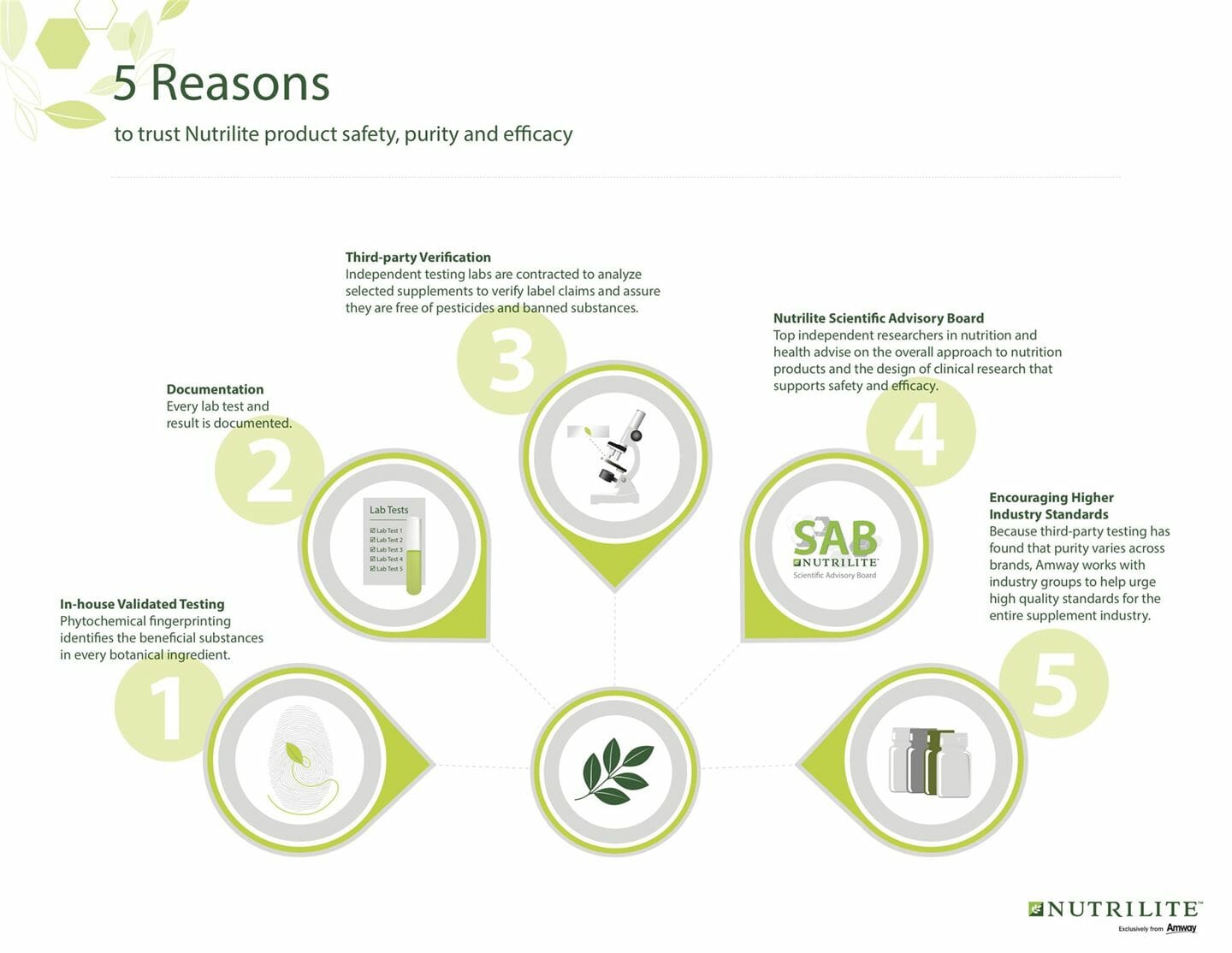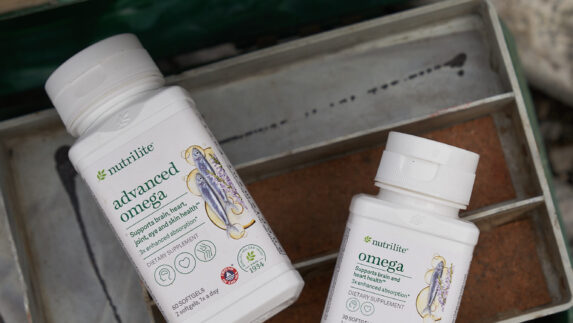Peering through a laboratory window at the Amway U.S. headquarters, you’ll see people in white coats performing an important test. Using an analytical instrument called an HPLC (High Performance Liquid Chromatograph) they are making sure that ingredients in Amway Nutrilite™ dietary supplements are present at the amounts listed on the labels.
It’s a test the company’s scientists perform many times before a supplement reaches consumers. They do it for several reasons. For one, customers expect scientifically verified products. For another, Nutrilite is committed to the safety, purity and efficacy of its supplements and is highly particular about its ingredients. It’s a commitment Nutrilite has kept for more than 80 years.
“There’s a cost/value benefit that we’re giving our consumers through validated testing of ingredients. We can show that our products are high-quality.” – Mark Proefke, Ph.D., manager, Amway Analytical Sciences
Amit Chandra, Ph.D., Distinguished Scientist and Amway research and development manager, summed up the company’s commitment to quality in a word: “Documentation,” he said. “We document everything that we do.”
The company uses a technique called “phytochemical fingerprinting,” a laboratory test using state-of-the-art chromatography technology to identify and benchmark unique phytonutrients present in botanical ingredients. It’s a complicated and expensive process.
“There’s a cost/value benefit that we’re giving our consumers through validated testing,” said Mark Proefke, Ph.D., manager of the Amway Analytical Sciences department. “We can show that our products are high-quality.”
Nutrilite uses healthy dietary components called phytonutrients in its supplements. Phytonutrients are natural compounds found in fruits and vegetables that promote a range of health benefits. Supplements that contain only synthetic ingredients, rather than combining them with plant materials, lack the many beneficial phytonutrients that come from natural plant sources, Proefke said. Acerola cherry, for example, contains hundreds of phytonutrients.
Supplements that contain only synthetic ingredients, rather than combining them with plant materials, lack the many beneficial phytonutrients that come from natural plant sources.
“Phytonutrients impart their many health benefits by working together,” Chandra explained. “The word ‘holistic’ is important.” It would be cheaper to produce products with only synthetic nutrients, but “then you would be losing out on the efficacy of that botanical from a holistic point of view,” he said.
To add another level of validation, Nutrilite submits many of its products for independent, third-party testing to prove that they are pure and high-quality. For example, we work with NSF International, an independent product testing organization.
“I would say that we have such confidence in our quality systems that we welcome having a third party verify that we are producing quality products,” said Sandy O’Day, quality assurance manager for the Nutrilite™ business line.
Twice a year, NSF also inspects Nutrilite™ production facilities in Buena Park, Calif., and Ada, Mich., to certify that they meet the U.S. Food and Drug Administration’s good manufacturing practices standards. In addition, the International Organization for Standardization inspects the company’s Buena Park lab annually to certify that it meets the highest standards.
Independent third-party labs routinely test ingredients in dietary supplement products and have found that purity varies across companies tested. Amway works with industry groups such as the American Botanical Council and the Council for Responsible Nutrition to help urge higher quality standards across the supplements industry.
Third-party testing “gives another level of assurance to the customer” that Nutrilite™ supplements meet the highest quality standards, O’Day said, adding that it also gives Amway Business Owners the confidence to “stand behind what Nutrilite does.”
Independent third-party labs routinely test ingredients in dietary supplement products and have found that purity varies across companies tested. Amway works with industry groups such as the American Botanical Council and the Council for Responsible Nutrition to help urge higher quality standards for the entire supplements industry.
“If this industry gets a black eye, then we all get a black eye,” Chandra said.
Even while supplements are still in the development stage, Nutrilite seeks outside validation of its science.
“The Nutrilite Scientific Advisory Board has made many key contributions in the realm of advice on our overall approach to specific nutrition products, as well as the design of clinical research that is conducted in support of product efficacy and safety,” said Keith Randolph, Ph.D., senior nutrition technology strategist who leads the Nutrilite Scientific Advisory Board.
Board members are some of the world’s top researchers in nutrition and health. Their dedication helps raise the bar of scientific excellence for Amway™ brands, helping ensure that Amway customers get the best of science every time they buy Amway™ health and beauty brands.
While Nutrilite is passionate about the truthfulness of what is in its supplements, its product claims go beyond science. For example, Nutrilite can assure Amway Business Owners that they are distributing the world’s number one selling vitamins and dietary supplements brand, because Euromonitor International, the world’s leading independent provider of strategic market research, has verified that fact. (Source: Euromonitor International Limited, www.euromonitor.com/amway-claims). That might surprise some consumers, since Nutrilite doesn’t do a lot of advertising through the mass media.
Nutrilite also can claim to be “the only global vitamin and mineral brand to grow, harvest, and process plants on its own certified organic farms,” according to Euromonitor International (www.euromonitor.com/amway-claims).
Nutrilite grows plants on 6,400 acres of its own certified organic farms in Brazil, Mexico and the United States and processes them in its own facilities. This vertical integration lets Amway maintain authority over every step of the process.
Those plants that Amway is unable to grow on its own farms, Nutrilite buys from other farms under its rigorous NutriCert™ certification program, which assures that its suppliers follow the same high quality standards that Nutrilite uses on its own farms.
“From seed to supplement, we are in control of the quality of ingredients,” Chandra said, beginning when the seeds are planted and continuing through every step of manufacturing.
“From seed to supplement, we are in control of the quality of ingredients.” – Amit Chandra, Ph.D., Amway research and development manager
Nutrilite grows plants that have the highest concentrations of p
hytonutrients that are beneficial to people’s health. The acerola cherries Nutrilite grows on its farm in Brazil, for example, contain one of nature’s most concentrated forms of naturally occurring vitamin C.
Through a process called “harvest optimization,” the company closely monitors the plants, picking them when the phytonutrients are at their peak. Acerola cherries, for instance, are at their nutritional peak and harvested while still green.
Growing the plants organically not only assures that they are free of pesticides and other contaminants, but it increases the level of phytonutrients they contain.
“When the plants are grown in an organic environment, they have to produce their own defenses,” Chandra said, “which they do by making phytonutrients.”
All of this is why Amway can say that when you buy a Nutrilite™ supplement you’re assured you’re getting exactly what the label says – quality, purity and product composition controlled by Amway from seed to supplement, and verified by in-house and third-party testing.
That’s the kind of information Amway Business Owners and customers need to know.
“Most Amway Business Owners are seeking credibility,” Proefke said. “We do a really good job of giving them credibility.”




